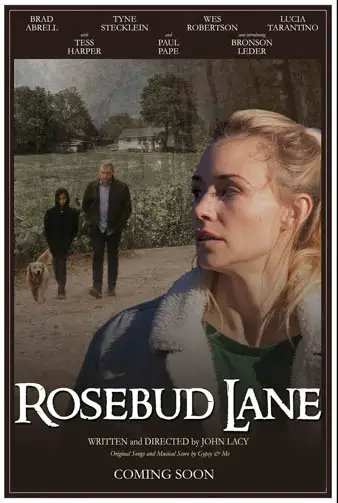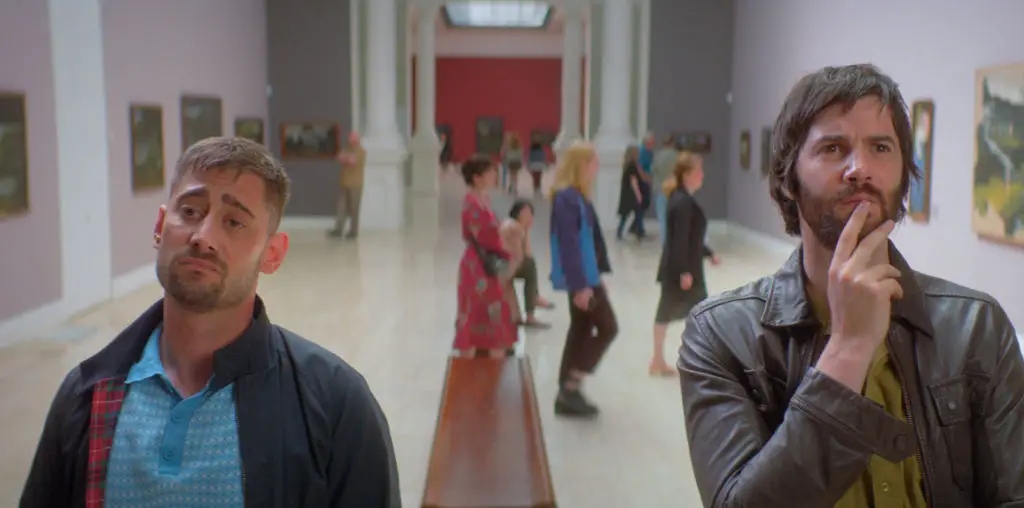
Someone said to me that when you avoid conflict, it never goes away. Instead, it just intensifies over time. So let’s explore conflict and avoidance in John Lacy’s feature film, Rosebud Lane. Sidney (Brad Abrell) is a Hollywood filmmaker suffering from severe burnout. With a deadline looming, he is of no use to his wife and partner, Monica (Lucia Tarantino). That is until Sidney receives a card from his 10-year-old son, Aaron (Bronson Leder).
A decade ago, he had an affair with small-town girl Ginny (Tyne Stecklein), and Aaron was the product. Sidney tried to do the right thing by sending child support, but Ginny refused the money and ghosted him. Feeling guilty (and maybe in need of creative inspiration), Sidney heads off to North Carolina to meet the son he only knew as an infant.
Immediately after arriving in Hendersonville, Mr. Hollywood receives a lukewarm, small-town Southern reception. While knocking on Ginny’s door, he’s greeted by Boone (Wes Robertson), who warns Sidney to go back home. Instead, Sidney heads to the diner where he first met Ginny, and as luck would have it, she still works there. The reunion is warm, with Ginny insisting that she’s fine and still doesn’t need his help. That night at dinner, Sidney discovers that Aaron is a chip off the old block, as his son is a massive fan of old movies establishing a perfect connection between father and son.
Sure, Rosebud Lane could end with everyone living “happily ever after,” but this reunion begins to conjure old feelings and memories. The stress and anxiety send Sidney back to drinking. For Ginny, as safe as she feels with him, she pushes back at any attempt he makes to help them emotionally and financially. Though not his fault, Sidney’s presence is a catalyst for a series of unfortunate events in Ginny’s life. Her landlord, Bradford (Paul Pope), is evicting her. He says he’s selling their home to real estate developers, but there’s more to the story. As Sidney and Aaron bond, Ginny pulls back from Sidney.
“…Sidney heads off to North Carolina to meet the son he only knew as an infant.”
The film is Sidney and Ginny’s story. He must come to terms with the choices he made and connect with a son he never knew. Sidney also has this overwhelming need to atone for not being around for Ginny and Aaron. As a Hollywood director and screenwriter, he sees life like the movies. Every experience in North Carolina is a constant reminder of loglines of old films as Sidney struggles to delineate between real life and fictional plots.
On the other hand, Ginny is in complete survival mode, stuck in a small town and a continual target of the male gaze. She is determined to do whatever it takes to raise her son on her terms. In a way, she’s become a slave to her circumstances. As a result, Ginny does not welcome Sidney’s attempts to fix her life.
For the most part, Rosebud Lane is a lite drama about the leads returning to a single season from their past. It’s a family/relationship drama, though it takes an unexpectedly dark turn at the end. I wrestle a bit with this tonal shift. At first, it seemed out of place, but it’s also the moment I think about the most. It brings resolution to the story, while at the same time, it doesn’t. I love this ambiguity in stories.
I’d classify Rosebud Lane in the Lifetime or Hallmark level of drama, exploring human relationships with relatively low stakes. There’s a delicate balance of dramatic tension between Sidney and Ginny that writer/director John Lacy expertly maintains. But the film’s success is primarily due to Brad Abrell and Tyne Strecklein’s performances. Both actors understand the nuances of their characters and, at the same time, elevate the work of their supporting cast. This is a solid drama all around.

"…I love this ambiguity in stories."


